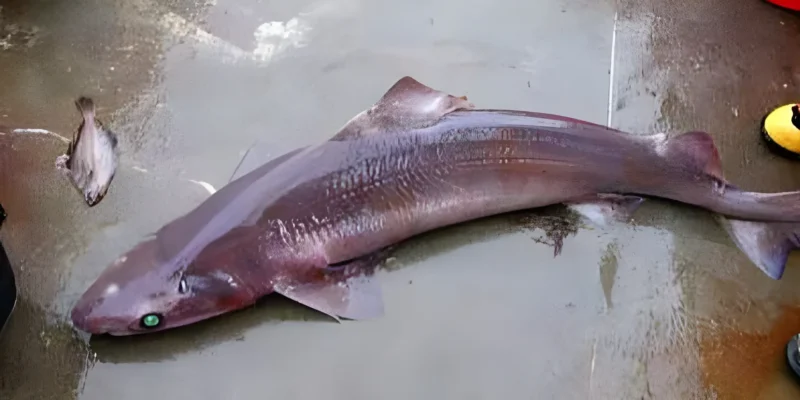In the port of Bosaso in Puntland, there is bustling activity between three and nine in the morning. Traders, fishermen, food vendors and officials loudly negotiate over the nightly catch – amid crumbling processing rooms, makeshift food stalls and open fish markets. Among the many fish species, the small gulper sharks are in particular focus. While a clerk records the catch quantities, a young man dissects the animals, removes the fish stomachs and places the livers in plastic buckets.
“The business is going well,” he tells researchers from the ENACT project on organized crime.
In semi-autonomous Puntland, liver oil from gulper sharks has become the core of a growing illegal business. According to TRAFFIC, it is in demand because of its high squalene content – for cosmetics, dietary supplements and pharmaceuticals, especially in Asian markets. The global market for shark liver oil was around 157.2 million US dollars in 2024 and could grow to 263.6 million US dollars by 2033.
Biology that makes them vulnerable to overfishing
Several gulper shark species are considered endangered or critically endangered. They grow slowly, reach sexual maturity late (females at about 16 years, males at about 18 years) and have extremely low reproduction rates – only one pup per two-year gestation period. Deep-sea sharks are therefore even more vulnerable to overexploitation than most other marine vertebrates. According to TRAFFIC data, half of the species used for the international liver oil trade are threatened with extinction; in the southern Indian Ocean, the gulper shark population collapsed by 97 percent between 2015 and 2020.
Ban on paper, thriving black market
In August 2024, Puntland's government banned the catching of gulper sharks and adopted further measures to strengthen marine governance. Yet weak enforcement allows the lucrative trade to continue growing. Official statistics are lacking, but local fishermen report declining catches. ENACT research in Bargaal, Qandala and Bosaso confirms the worrying development in the Gulf of Aden.
Interview partners describe a network of influential government actors, local clan elders, businessmen and fishermen that organizes catching, processing and export. Despite the ban, the business continues: organs are sold to a small circle of buyers in Bosaso – for about one US dollar apiece, regardless of size. In makeshift facilities, the oil is extracted using primitive, unregulated methods – without oversight, environmental standards or permits.
Crude oil, quick profits, high risks
“We chop up the liver, heat it to 70 to 100 degrees and add alkaline solutions to control the pH level,” explains an operator.
The next step is distillation and filtering with centrifuges to remove impurities and obtain squalene-rich oil. Small teams connected to exporters or intermediaries check the quality and organize transport. The lack of regulation endangers product quality and leads to environmental and health problems – for example through the release of contaminated waste.
In Somalia, the oil costs around 14.44 to 38.50 US dollars per kilogram, depending on quality; end buyers abroad pay significantly more. To evade controls, the goods are illegally loaded onto foreign ships at sea – bypassing official ports, landing sites or export channels. Shipments are hidden under legal cargo or disguised through intermediaries. This covert supply chain mainly serves markets in China and the Gulf region.
Knowledge gaps and possible CITES protection
Experts from TRAFFIC, including Glenn Sant and Markus Burgener, point to major knowledge gaps: regarding the scale of the global trade, the origin and capacity of processors, and the quality of the oil. Due to the lack of specific codes for gulper shark liver oil, it is unclear how much is being exported. A CITES proposal is currently under discussion that could place gulper sharks under protection in December 2025. Countries would then have to issue licenses and demonstrate legal, sustainable fishing practices; in cases of illegal catch, global trade bans would apply. Traceability along the supply chain would be mandatory.
What needs to be done now
Puntland’s bans have not yet taken effect, but they are a necessary first step. What is needed is the harmonization of legal frameworks between Somalia’s federal and state levels – both for fishing and for liver oil processing. Equally important are reliable data on gulper shark refuges and a comprehensive management strategy for the species.
The establishment of maritime monitoring systems against illegal, unreported and unregulated fishing has proven effective. Indonesia published its vessel monitoring system in cooperation with Global Fishing Watch, thus creating greater transparency for fisheries data and management. More investment in monitoring and enforcement would also be important for Somalia – for example in partnership with the FAO, the UN Office on Drugs and Crime, and the European Union – to identify and deter illegal operations.




